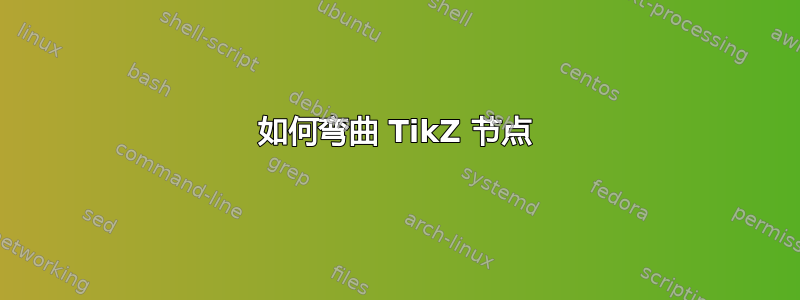
考虑下面的 MWE,它输出以下箭头

是否可以弯曲这样的节点,使其看起来像

(抱歉,图片质量不太好,我不是 Photoshop 艺术家)。如果可能的话,我希望字体可读,然后创建一个向右弯曲的箭头。
你知道有没有什么办法吗?
\documentclass{article}
\usepackage{tikz}
\usetikzlibrary{shapes.arrows}
\tikzstyle{arrownode}
= [ shape=single arrow
, single arrow head extend=.75em
, single arrow head indent=.25em
, minimum width=3em
, draw
, font=\sc
]
\begin{document}
\begin{tikzpicture}
\node[arrownode] at (0,0) {foobar};
\end{tikzpicture}
\end{document}
答案1
使用 TikZ v3.00,您可以使用非线性变换来做一些奇妙的事情。这里的问题在于文本,因为 TikZ 还将节点文本放入框中并希望获得最佳效果。因此,框中的所有内容都会受到 TikZ 看到的框句柄的相同变换的影响(例如添加\hspace{3cm}到节点内容)。
\documentclass[]{article}
\usepackage{tikz}
\usetikzlibrary{shapes.arrows}
\usepgflibrary{curvilinear}
\usepgfmodule{nonlineartransformations}
\tikzset{arrownode/.style={
shape=single arrow,
single arrow head extend=.75em,
single arrow head indent=.25em,
minimum width=3em,
draw,
}
}
\begin{document}
\begin{tikzpicture}
{
\pgfsetcurvilinearbeziercurve
{\pgfpoint{0mm}{30mm}}
{\pgfpoint{15mm}{30mm}}
{\pgfpoint{30mm}{15mm}}
{\pgfpoint{30mm}{0mm}}
\pgftransformnonlinear{%
\pgfpointcurvilinearbezierorthogonal%
{\csname pgf@x\endcsname}%
{\csname pgf@y\endcsname}%
}%
\node[arrownode,transform shape nonlinear=true] at (3,0) {why no rotation?};
}
\end{tikzpicture}
\end{document}

不过,你可以切换到文本装饰,我还没有仔细研究过 Mark Wibrow 如何对转换进行编码,但也许你可以让文本接受当前的转换矩阵(我还不知道)。所以,如果你用
\node[arrownode,transform shape nonlinear=true] (a) at (3,0) {\phantom{Why not rotating?}};
\path[decoration={text along path,
text={Why not rotating?},
text align=center,
raise=-0.5ex
},postaction={decorate}](a.west) -- (a.east);
你会得到

请注意,由于变换是非线性的,因此放置节点的位置很重要,因此在此示例中,如果将节点放置得更远,效果将更加明显。您可以看到顶部的白色空间来自变换后的画布。使用贝塞尔曲线坐标进行操作,您将获得惊人的结果 :)


